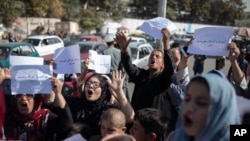A new legal assessment says the Taliban's treatment of women and girls in Afghanistan "amount to the crime against humanity of gender persecution" and should be investigated under international law, according to two human rights groups.
Amnesty International and the International Commission of Jurists (ICJ) released their joint 62-page report on Friday, saying the Taliban have stripped women and girls of their "basic rights and freedom" since retaking control of the country nearly two years ago.
The document urges International Criminal Court prosecutors to include the "egregious human rights violations" in their ongoing investigation into the situation in conflict-ridden Afghanistan.
"Let there be no doubt: this is a war against women — banned from public life; prevented from accessing education; prohibited from working; barred from moving freely; imprisoned, disappeared, and tortured, including for speaking against these policies and resisting the repression, said Agnès Callamard, the secretary general at Amnesty International.
She said the "organized, widespread and systemic" Taliban curbs against women are "international crimes."
The fundamentalist former insurgent group seized power in Afghanistan in August 2021, when U.S.-led Western troops terminated their involvement in the war with the Taliban and departed the country after almost two decades.
The de facto Afghan authorities have since imposed sweeping edicts and regulations on women, excluding them from most public sectors and political roles and barring girls from receiving an education beyond primary school.
Friday's joint assessment lamented that the Taliban had turned Afghan females into "second-class citizens." They have arbitrarily arrested women for so-called "moral crimes" and for their participation in peaceful demonstrations against the curbs, it noted.
"The Taliban's campaign of gender persecution is of such magnitude, gravity and systematic nature that, cumulatively, the acts and policies form a system of repression which aims to subjugate and marginalize women and girls across the country," said ICJ Secretary General Santiago Canton.
The report also urged other states to exercise universal jurisdiction or other lawful means to bring to justice Taliban members suspected of responsibility for crimes under international law.
"This should send a clear message to Taliban leaders and members that their discriminatory policies against women and girls are not and never will be tolerated."
The two top global organizations called on Taliban authorities to remove the ban on girls' education beyond primary school and allow women working for the government and elsewhere to return to work.
The Taliban have yet to immediately comment on the assessment.
The international community has not formally recognized the Taliban as the official government, mainly because of human rights concerns and the treatment of women.
The Taliban defend their governance as aligned with Afghan culture and Sharia, or Islamic law, ruling out any compromise.
The United Nations and other aid groups say that the restrictions on their Afghan female staff have undermined their work in a country where 28 million people are in urgent need of assistance.








